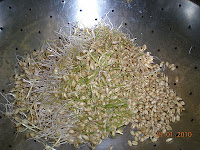The hip, not-so-new thing amongst organic food lovers and locavores (people who try to source all their food from within a 100 mile radius of where they live) is cooking with sprouted grains. You take whole grains, sprout them by rinsing them in water twice a day for a few days, grind them into a paste and bake. Apparently sprouting grains helps one absorb more minerals, increases the vitamin content of the grain, and is more easily digested. Woohoo. Plus, it is meant to taste fabulous. Inspired by an article in my 2010 Permaculture Diary, I decided to have a go at baking “Essene bread” (the Essene’s, my diary tells me, were “peace loving, mostly celibate, vegetarian folk who lived communally with collective ownership” around the time just before and after Jesus. They have since, not so surprisingly, died out).
I took four cups of whole dry wheat grain, and watched with amazement as the little brown grains grew longer and longer white and green tails over the space of a couple of days. When the sprouts were long enough (approximately the same size as the grain), I threw them in a food processor with a bit of water, and churned out a gooey paste. I discovered I’d used a little too much water, and the paste was a little too gooey. But I persevered. I beamed positive vibes at the round goo as I placed it in the oven and let it bake for over 2 hours.
The result? The edges, which had caramelised, were as delicious as the article had promised. Like a rich dark brown sourdough with bursts of juicy flavour. The insides however were just sloppy goo... But, hurrah! I have baked with sprouted grains! And I know for next time not to use so much water, to set the oven at a slightly lower temperature, and to let it all bake for longer. I’ll be back Essene bread... even if your inventors never will be!




No comments:
Post a Comment